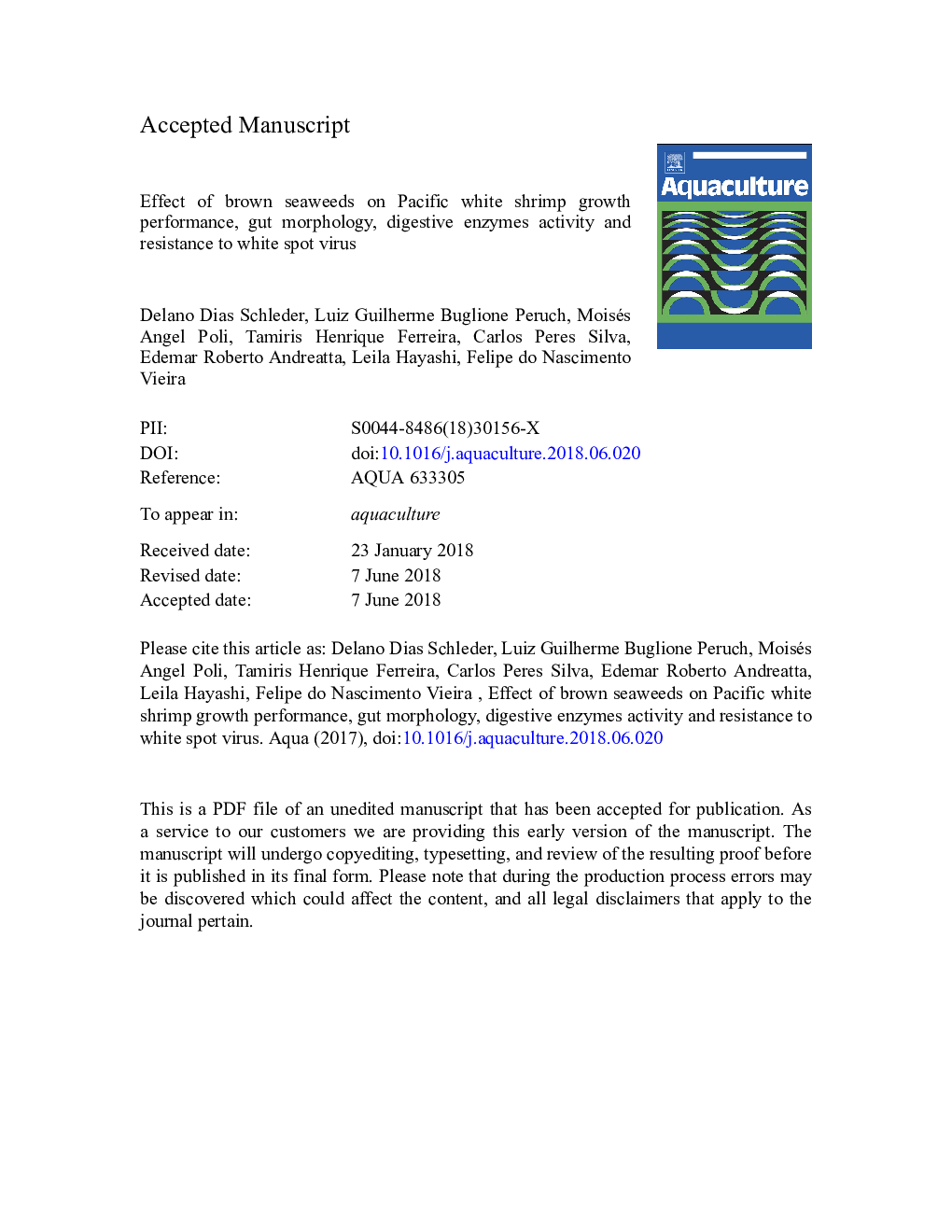| کد مقاله | کد نشریه | سال انتشار | مقاله انگلیسی | نسخه تمام متن |
|---|---|---|---|---|
| 8493083 | 1552793 | 2018 | 35 صفحه PDF | دانلود رایگان |
عنوان انگلیسی مقاله ISI
Effect of brown seaweeds on Pacific white shrimp growth performance, gut morphology, digestive enzymes activity and resistance to white spot virus
ترجمه فارسی عنوان
اثر جلبک های دریایی قهوه ای در عملکرد رشد میگو های سفیدپوست ساحلی، مورفولوژی روده، فعالیت آنزیم های گوارشی و مقاومت به ویروس سفید
دانلود مقاله + سفارش ترجمه
دانلود مقاله ISI انگلیسی
رایگان برای ایرانیان
کلمات کلیدی
موضوعات مرتبط
علوم زیستی و بیوفناوری
علوم کشاورزی و بیولوژیک
علوم آبزیان
چکیده انگلیسی
This work aimed to evaluate growth performance, gut histology, digestive enzyme activity and resistance to challenge with White Spot Syndrome Virus (WSSV) of Litopenaeus vannamei fed 0.5, 2 and 4% of dry biomass from the brown seaweeds Sargassum filipendula and Undaria pinnatifida. Shrimp (4.23â¯Â±â¯0.15â¯g) were reared for 38â¯days in 800â¯L tanks (40 animals per tank) in triplicate under constant aeration (O2â¯>â¯5â¯mgâ¯Lâ1), controlled temperature (29.06â¯Â±â¯0.32â¯Â°C) and 100% daily water exchange (static). Animals were fed five times per day, and the amount of feed was calculated in accordance with a pre-established feed conversion rate method. To estimate survival and growth, all animals from each tank were weighed and counted every week. At the end of the experiment, the hepatopancreas from each of six shrimp per treatment was collected to assess the digestive enzymes, and the anterior abdominal segment from each of four shrimp per treatment was isolated to evaluate the gut histology. For WSSV challenge, 40 animals per treatment were infected and kept for 72â¯h to determine mortality. Growth performance was not affected by seaweed addition in the diet. However, the lowest level of both seaweeds increased shrimp gut epithelial surface for nutrient absorption, and all levels of S. filipendula and 4% of U. pinnatifida increased amylase activity, while lipase activity was only stimulated by 4% of U. pinnatifida. Proteolytic enzymes were not affected by the addition of dietary seaweed. Additionally, 4% of U. pinnatifida resulted in lower mortality after WSSV challenge (48%) compared to control (74%). Therefore, seaweed addition improved shrimp digestive capacity and resistance to WSSV challenge, but without impairing growth performance.
ناشر
Database: Elsevier - ScienceDirect (ساینس دایرکت)
Journal: Aquaculture - Volume 495, 1 October 2018, Pages 359-365
Journal: Aquaculture - Volume 495, 1 October 2018, Pages 359-365
نویسندگان
Delano Dias Schleder, Luiz Guilherme Buglione Peruch, Moisés Angel Poli, Tamiris Henrique Ferreira, Carlos Peres Silva, Edemar Roberto Andreatta, Leila Hayashi, Felipe do Nascimento Vieira,
